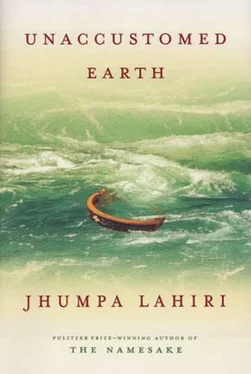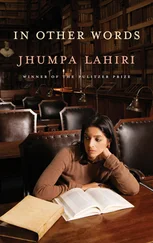Paul rubbed his eyes behind his glasses, displacing them.
"What?"
"You've damaged my shoulder. I had to get an MRI. I may need surgery."
The woman, now standing a few feet behind Farouk, said something Paul was unable to hear.
"He should know," Farouk said to the woman, his voice rising unpleasantly. Then he shrugged, and they walked off together. There was something curious about the way they were walking, together and yet with a space between them. It was only then that Paul noticed a small yellow dog at the end of a very long leash, stretched taut in the woman's hand, pulling her along the path.
P ART TWO. HEMA AND KAUSHIK
I had seen you before, too many times to count, but a farewell that my family threw for yours, at our house in Inman Square, is when I begin to recall your presence in my life. Your parents had decided to leave Cambridge, not for Atlanta or Arizona, as some other Bengalis had, but to move all the way back to India, abandoning the struggle that my parents and their friends had embarked upon. It was 1974. I was six years old. You were nine. What I remember most clearly are the hours before the party, which my mother spent preparing for everyone to arrive: the furniture was polished, the paper plates and napkins set out on the table, the rooms filled with the smell of lamb curry and pullao and the L'Air du Temps my mother used for special occasions, spraying it first on herself, then on me, a firm squirt that temporarily darkened whatever I was wearing. I was dressed that evening in an outfit that my grandmother had sent from Calcutta: white pajamas with tapered legs and a waist wide enough to gird two of me side by side, a turquoise kurta, and a black velvet vest embroidered with plastic pearls. The three pieces had been arrayed on my parents' bed while I was in the bath, and I stood shivering, my fingertips puckered and white, as my mother threaded a length of thick drawstring
through the giant waist of the pajamas with a safety pin, gathering up the stiff material bit by bit and then knotting the drawstring tightly at my stomach. The inseam of the pajamas was stamped with purple letters within a circle, the seal of the textile company. I remember fretting about this fact, wanting to wear something else, but my mother assured me that the seal would come out in the wash, adding that, because of the length of the kurta, no one would notice it anyway.
My mother had more pressing concerns. In addition to the quality and quantity of the food, she was worried about the weather: snow was predicted for later that evening, and this was a time when my parents and their friends didn't own cars. Most of the guests, including you, lived less than a fifteen-minute walk away, either in the neighborhoods behind Harvard and MIT or just across the Mass Avenue Bridge. But some were farther, coming by bus or the T from Malden or Medford or Waltham. "I suppose Dr. Choudhuri can drive people home," she said of your father as she untangled my hair. Your parents were slightly older-seasoned immigrants, as mine were not. They had left India in 1962, before the laws welcoming foreign students changed. While my father and the other men were still taking exams, your father already had a PhD, and he drove a car, a silver Saab with bucket seats, to his job at an engineering firm in Andover. I had been driven home in that car many nights, after parties had gone late and I had fallen asleep in some strange bed or other.
Our mothers met when mine was pregnant. She didn't know it yet; she was feeling dizzy and sat down on a bench in a small park. Your mother was perched on a swing, gently swaying back and forth as you soared above her, when she noticed a young Bengali woman in a sari, wearing vermilion in her hair. "Are you feeling all right?" your mother asked in the polite form. She told you to get off the swing, and then she and you escorted my mother home. It was during that walk that your mother suggested that perhaps mine was expecting. They became instant friends, spending their days together while our fathers were at work. They talked about the lives they had left behind in Calcutta: your mother's beautiful home in Jodhpur Park, with hibiscus and rosebushes blooming on the rooftop, and my mother's modest flat in Maniktala, above a grimy Punjabi restaurant, where seven people existed in three small rooms. In Calcutta they would probably have had little occasion to meet. Your mother went to a convent school and was the daughter of one of Calcutta's most prominent lawyers, a pipe-smoking Anglophile and a member of the Saturday Club. My mother's father was a clerk in the General Post Office, and she had neither eaten at a table nor sat on a commode before coming to America. Those differences were irrelevant in Cambridge, where they were both equally alone. Here they shopped together for groceries and complained about their husbands and cooked at either our stove or yours, dividing up the dishes for our respective families when they were done. They knitted together, switching projects when one of them got bored. When I was born, your parents were the only friends to visit the hospital. I was fed in your old high chair, pushed along the streets in your old pram.
During the party it started snowing, as predicted, stragglers arriving with wet, white-caked coats that we had to hang from the shower curtain rod. For years, my mother talked about how, when the party ended, your father made countless trips to drive people home, taking one couple as far as Braintree, claiming that it was no trouble, that this was his last opportunity to drive the car. In the days before you left, your parents came by again, to bring over pots and pans, small appliances, blankets and sheets, half-used bags of flour and sugar, bottles of shampoo. We continued to refer to these things as your mother's. "Get me Parul's frying pan," my mother would say. Or, "I think we need to turn the setting down on Parul's toaster."
Your mother also brought over shopping bags filled with clothes she thought I might be able to use, that once belonged to you. My mother put the bags away and took them with us when we moved, a few years later, from Inman Square to a house in Sharon, incorporating the clothes into my wardrobe as I grew into them. Mainly they were winter items, things you would no longer need in India. There were thick T-shirts and turtlenecks in navy and brown. I found these clothes ugly and tried to avoid them, but my mother refused to replace them. And so I was forced to wear your sweaters, your rubber boots on rainy days. One winter I had to wear your coat, which I hated so much that it caused me to hate you as a result. It was blue-black with an orange lining and a scratchy grayish-brown trim around the hood. I never got used to having to hook the zipper on the right side, to looking so different from the other girls in my class with their puffy pink and purple jackets. When I asked my parents if I could have a new coat they said no. A coat was a coat, they said. I wanted desperately to get rid of it. I wanted it to be lost. I wished that one of the boys in my class, many of whom owned identical coats, would accidentally pick it up in the narrow alcove where we rushed to put on our things at the end of the day. But my mother had gone so far as to iron a label inside the coat with my name on it, an idea she'd got from her subscription to Good Housekeeping.
Once I left it on the school bus. It was a mild late winter day, the windows on the bus open, everybody's outerwear shed on the seats. I was taking a different bus than usual, one that dropped me off in the neighborhood of my piano teacher, Mrs. Hennessey. When the bus neared my stop I stood up, and when I reached the front the driver reminded me to be careful crossing the street. She pulled back the lever that opened the door, letting fragrant air onto the bus. I was about to step off, coat-less, but then someone cried out, "Hey, Hema, you forgot this!" I was startled that anyone on that bus knew my name; I had forgotten about the name tag.
Читать дальше












